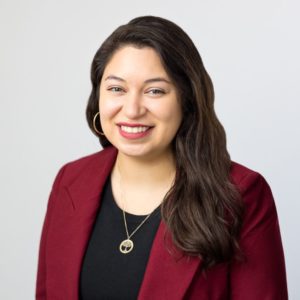
Young Invincibles has been empowering young adults for over a decade; our network of youth community and student leaders numbers in the thousands. Young adults have proven time and time again that they will be the change past generations have hoped for. All we need to do is set them up for success. YI has embarked on a campaign to highlight the many alumni who have passed through our youth programs. Some now work as our colleagues and teammates, while others have been trailblazers at other institutions and programs. Some started their own campaigns to empower others. All around the world, YI alumni are doing wonderful work in service of the community.
Check out this month’s alumni highlight, Martha Sanchez.
Over the course of our advocates programs, YI gathers and trains the next generation of local community leaders. Throughout the program, advocates learn how to tell their stories impactfully, speak to elected officials, advocate for policy change, cultivate community, advise YI on our strategic plans, and pursue a policy they are passionate about, all while gaining transferable skills.
This month, we reached out to former DC YI Scholars Program graduate Martha Sanchez to see what she’s up to. We asked her a couple of questions and asked if she had some wisdom to share with other advocates across the country.
What are you up to now after your time in the YI Scholars Program?
Today I serve as the Director of Health Policy & Advocacy at Young Invincibles! I lead our national health policy agenda and advocacy efforts, overseeing our health department team’s programming activities around health care literacy, outreach, and ACA enrollment. I’m very excited about our federal policy agenda objectives to improve access and affordability to health care, especially regarding mental health. I love that at YI we can bring young adults from all walks of life together to uplift their lived experiences and use our collective power to change policy for the better.
In between my YI internship and my comeback to YI as a director, I worked on Capitol Hill starting as an intern, then as an immigration caseworker in a congressional district office, and eventually as a legislative assistant in the U.S. House of Representatives, followed by serving as a health legislative assistant in the U.S. Senate.
What is a skill you learned during the program?
During the program, I learned to look at policy issues through an equity-centered lens by seeking to understand how different issues affect specific populations. This is easier to do at YI because we focus on improving the financial well-being of young people through higher education, health care, and the workforce. So, for example, when I arrived at YI, my passion was supporting and uplifting the immigrant community, especially other first-gen immigrants like myself. The policy team at the time was conducting a literature review on the financial outlook for millennials and their retirement prospects. Supporting that initial project allowed me to learn so much about young adults’ financial prospects and think critically about what those projections meant for first-generation college graduates and immigrants. Being at YI naturally helped me start to understand how different policy systems, whether immigration, health care, or higher ed, interact with one another. Specifically, I also learned that the best way to analyze, promote, and digest policy is by thinking about the real-life consequences on the most vulnerable and marginalized groups and to embrace, rather than discredit, the personal stories that result from policy. These are skills that I developed further after YI, and that helped carry my career on Capitol Hill. I believe it’s why I was able to transition from one day being an expert on immigration policy to another on transportation and aviation policy, to eventually settling into the health policy space.
Any advice for current and future advocates?
My advice is to embrace the power and knowledge that comes from your own personal experiences as you work towards advocating for policy change. Some spaces, especially in government, are intimidating and simply not built for us. However, we stand as the most to gain or lose from our level of civic engagement, so it’s important to let go of the doubt and imposter syndrome, and make our voices heard. I also encourage young advocates to open themselves up to new topics and policy systems that are interconnected so that you can approach policy with empathy and inclusivity towards communities you may not be as connected to.
